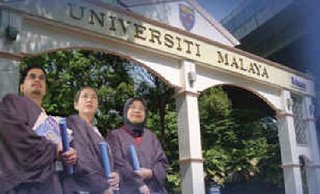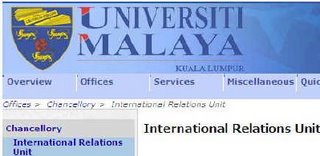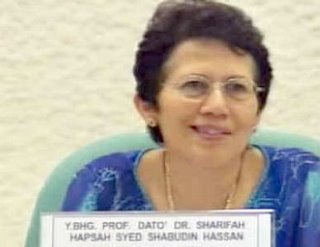GOING, Going GONE Soon UM World UNIVERSITY RANKING in Top 200; V C RAFIAH:NO More “PREMIER” Status for UM; UKM & UPM Move UP by GIVING More INFO
 Come another year University of Malaya (UM) will probably be out of the top 200 in Britain’s the Times Higher Education Supplement annual rankings if the rot is not arrested. Even its Vice Chancellor Datuk Rafiah Salim has thrown in the towel by altering the University mission’s statement by removing the adjective “priemier”. In contrast UKM and UPM after last year’s listing bucked up and followed the rules and crawled up the list. Credit must be given to UKM for their efforts (see below, NST article). But Datuk Dr Sharifah Hapsah (VC UKM) is aiming too high when she said "We do not consider this a success until and unless we reach the No 1 position"
Come another year University of Malaya (UM) will probably be out of the top 200 in Britain’s the Times Higher Education Supplement annual rankings if the rot is not arrested. Even its Vice Chancellor Datuk Rafiah Salim has thrown in the towel by altering the University mission’s statement by removing the adjective “priemier”. In contrast UKM and UPM after last year’s listing bucked up and followed the rules and crawled up the list. Credit must be given to UKM for their efforts (see below, NST article). But Datuk Dr Sharifah Hapsah (VC UKM) is aiming too high when she said "We do not consider this a success until and unless we reach the No 1 position" A sense of complacency has crept and set in UM and this can be seen in their websites from the various faculties. They have an International Relations Unit with a

There is a lot of talk but not much commitments on the part of the separate faculties. And it appears there is no co-ordination; each faculty is on their own; maintaining their own websites (farmed out to outside companies) with NO minimum standard of presentation. Surely the people in the computer science and information Technology faculty could lend a helping and leading hand in doing a single website with all the faculties under it having a standard format.. If the staff cannot offer their time, the students could do it as a project and exercise to update the websites. Is the task beyond their scope? If the THES researchers were to access UM website, they would not be getting anything new
 ABOVE: The academic staff list becomes an alphabetically directory, who is the boss or DEAN? Can you find any U website with such a listing?
ABOVE: The academic staff list becomes an alphabetically directory, who is the boss or DEAN? Can you find any U website with such a listing?
And in the Faculty of Education, the Academic staff is listed alphabetically and you wouldn’t know who is in charge but at least they list staff with the published papers and conferences. 

The worst is the Faculty of medicine, NOT a single faculty staff is listed or named , not even the Dean who has a picture and a message BUT no name (check here). Perhaps, the problem is that the staff turnover is so high and fast, that the webmaster felt it would be a waste of time to keep updating their staff. So keep them blank seems to be the answer.
ABOVE: The Engineering faculty website. How long has it been temporarily closed?
UM Accepts
Can you see (ABOVE) UM Vice Chancellor Datuk Rafiah Salim smilingly (is she really sad at all, the drop in ranking just a laughing matter to her!) said: “I must say this is the saddest day of my career. Looking at my colleagues I feel everybody is disappointed. The university acknowledged that the 4 Criteria used in the THES were valid as proxies in values of higher education. Those criteria is not everything.”
Its Vice Chancellor Datuk Rafiah Salim, who was saddened by the turn of events, said that it also acknowledged that the top spot had been taken by Universiti Kebangsaan Malaysia (UKM).
"We came out with our new mission which was launched yesterday and in our new mission statement we have actually dropped the adjective 'premier'.
"We are very realistic people really. Also we don't want to keep on believing and living in past glories, we would like to build from where we are now towards the future," she told a press conference here Friday.
Also present were Universiti Kebangsaan Malaysia (UKM) Vice Chancellor Prof Datuk Sharifah Habsah Syed Hassan Shahabuddin, Universiti Putra Malaysia (UPM) Vice Chancellor Prof Dr Nik Mustapha Raja Abdullah and Universiti Sains
Rafiah pointed out that in the past few months, UM had taken several action plans to improve its ranking in the future.
"It's probably a way of getting the UM family to really together bring up Universiti Malaya again," she said.
She however admitted that the result was one of the saddest days in her career.
The nation's oldest university, which was ranked among the world's top 100 universities two years ago, was ranked 192nd spot by THES, down from 169th spot last year. In 2004, it was the only Malaysian university which made the THES' top-200 list.
UKM was ranked 185th by THES in its 2006 rankings published yesterday, a vast improvement from the 289th spot last year.
VC: Second drop hard to face
Although Universiti Malaya had pledged to work harder on getting a better placement last year, this did not happen.
In fact, its recently appointed vice-chancellor, Datuk Rafiah Salim, said they were aware that not enough had been done and the further drop in rankings was not unexpected.
Rafiah: Was aware that not enough had been done and the drop was not unexpected. When asked how she felt on learning of UM's decline, Rafiah said: “It was one of the saddest days of my career. Looking at my colleagues in this room, I can see that they are all very sad too.”
UM dropped from 169 last year to 192 in the rankings. In 2004, in the inaugural QS-THES World University Rankings, the university was within the top 100, at 89.
“The reason for the drop is simply that we have not done enough in meeting the requirements, and for the next 12 months, we will specifically address those criteria without undermining a quality university education,” Rafiah said.
The added that the drop was a way of bringing “the UM family” together to work its way up again. “We will not rest on past glories,” said Rafiah, who chaired a joint press conference of four universities.
Present at the event were Universiti Kebangsaan Malaysia VC Prof Datuk Dr Sharifah Hapsah Syed Hasan Shahabudin, Universiti Putra Malaysia VC Prof Dr Nik Mustapha R. Abdullah, and Universiti Sains Malaysia deputy VC (academic and international affairs) Prof Datuk Rosihan M. Ali.
In a joint statement issued at the press conference, the four universities said they would be paying close attention to their performance in the criteria used in the ranking.
“We may question the validity and reliability of the data on international students and faculty, but we cannot ignore the data on peer review, employer or recruiter review, faculty-student ratio and the citation index,” the statement said.
The vice-chancellors emphasised that the THES rankings were only one indicator of a university’s quality.
= = = = == = = = = = = = = ==
University rankings: The secret behind UKM's success
Careful planning and lots of hard work, says former Universiti Kebangsaan Malaysia (UKM) vice-chancellor, Professor Datuk Mohd Salleh Mohd Yasin, who is now chief executive officer of the National Accreditation Board (LAN).
His words bear weight because UKM has managed to break into the list of the top 200 world universities for the first time.
Barely a year ago, UKM received a fax from Hussain Mehdi, a researcher with Quacquarelli Symonds and Evidence Ltd from the
When asked how the researcher had "tracked down" UKM, his answer was through the university’s website.
The rest is history and UKM was ranked 91 out of the top 100 science universities in the world last year.
And one year later, UKM has moved up 104 places from its 289th position last year on THES to the 185th spot this year.
Recognising that the university’s website had caught the attention of the researcher from Quacquarelli Symonds, UKM decided to beef up its content.
"Using Malay and English, we wanted our website to be user-friendly. We posted the curriculum vitae of academics and their areas of research; the top five publications of every lecturer were also posted on the website.
"That way, not only are we informing the public about our academics but we are also helping foreign postgraduates to identify the lecturers of their choice," says Salleh, who is also a professor of medical mycology at UKM’s Faculty of Allied Health Sciences.
Every faculty has an in-house webmaster. There is an internal exercise to rate all faculty websites. A team is put in charge of screening for informational, typological and grammatical errors.
Next, UKM chose rebranding to give the university a global flavour. It became known as the National University of Malaysia.
Its slogan, "The National University with International Reach", also highlighted the importance of UKM as an international player.
International bulletins about the university were distributed at embassies in
"We had to think about putting concise information in one-page brochures. Nobody wanted to carry extra baggage home, least of all thick advertorial booklets.
"At conferences, we would leave our brochures outside meeting rooms. By the time we finished presenting our papers, all the brochures were in people’s bags, going to other parts of the world," says Salleh.
"It is not surprising that the number of international students at UKM has doubled in the last two years."
For a university to be counted, producing quality graduates is a major concern. Visitors are amazed that the university produces around 120 doctorates and 1,400 master’s degree holders annually.
"We want to ensure that we have quantity and also quality. A fine example is our engineering degree that has received accreditation from the Washington Accord."
Under strategic planning, the three main items on the agenda are research, internationalisation and quality assurance. Research collaboration, especially with European and Australian universities, gained importance.
Research grants were sought from overseas through the Asia-Link Programme, an initiative of the European Commission to promote regional and multilateral networking between higher education institutions in
Salleh says research efforts need to be further boosted and corporate communication is vital.
He says there should be an entity that works to spruce up networking and to let others know of UKM’s existence.
"Know who you are, where you are and what you are doing – that is the key to success," he adds.
Britain’s the Times Higher Education Supplement annual rankings are based on measures such as peer review, employer survey, international students, staff to student ratio and the number of times research is cited by other academics.
Mixed reaction to ranking list; NST
There was elation, and sadness, yesterday as top officials of four public universities gathered to tell reporters what the results of the Times Higher Education Supplement (THES) actually meant. The vice-chancellors of Universiti Kebangsaan
-
Rafiah, however, saw some good arising from the university’s drop in ranking, saying it would spur the staff to get the institution back into shape. She said she had long suspected that the university would fall in ranking, and thus had taken steps over the past months to make improvement.
"But nothing much can be done in the last minute." On local and Asian universities, she believed a fair comparison was not possible. She cited
She said THES did not address research done by individual universities nor take into consideration inventions and findings in areas like health and virus research.
"We must take the THES rankings with a pinch of salt."
-
 Datuk Dr Sharifah Hapsah Syed Hasan Shahabudin: "We do not consider this a success until and unless we reach the No 1 position."
Datuk Dr Sharifah Hapsah Syed Hasan Shahabudin: "We do not consider this a success until and unless we reach the No 1 position."
Sharifah said: "We have to continuously strive and improve our rankings through quality education.’ On whether UKM would increase its tuition fees as it was now the No 1 university in
"We will increase tuition fees only when all public universities agree on a specific increment," she added.
-
It’s not often that a university jumps 102 places in the THES ranking, an achievement that UPM can lay claim to. Nik Mustapha said the move from 394th spot to 292th spot was due to UPM correcting the perception that it was a university concentrating only on agriculture.
Universiti Sains
Rosihan is pleased with the 277th spot, 49 places up from 326 last year. "This is a far better showing for us than last year," said the elated academician.
Mustapa happy with results;

Universiti Kebangsaan
But UM’s slide of 23 places from 169th position is a source of concern to the Higher Education minister.
Mustapa has asked UM for a plan of action to check the decline in standing in the THES ranking.
"I have had frequent talks with UM Vice-Chancellor (Datuk Rafiah Salim) and her senior staff on the matter of quality," he said when asked on how he was handling the matter.
The minister was happy with Universiti Sains
"Viewed in totality, this indicates an upward shift in Malaysian university standing and with the commitment of the respective vice-chancellors. I am confident our universities are well-positioned to grow as drivers of
Mustapa told vice-chancellors of public universities yesterday that they should continue to strive for excellence despite the announcement of worldwide ranking.
"We are committed to enhancing the quality of higher education towards establishing our country as a hub of educational excellence."



4 Comments:
wow, from the picture, I can tell Tok Pa is really a happy man!
Well done. One of your best posts to date. Keep it up.
Almost all faculty websites in UM - not only insufficient information or no information, but also bad English - full of spelling and grammatical errors, worse than many websites of secondary schools, confirming their lousy standards!!
universities in malaysia will never shine as long there is no meritocracy in their enrolment practice. i bet they will never be top 100 again.
Post a Comment
<< Home